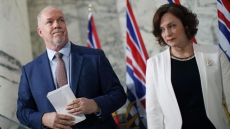VANCOUVER - Profit for doctors providing surgery in private clinics is at the heart of a trial that threatens to undermine Canada's universal health-care system and its principles of equity and fairness for everyone, regardless of whether some patients' bank accounts allow them to jump the public queue, a federal lawyer says.
B.J. Wray, representing the attorney general of Canada, told the B.C. Supreme Court that an orthopedic surgeon's legal challenge aiming to strike down provisions of the province's Medicare Protection Act is based on increasing income because doctors enrolled in the public system are prohibited from also charging patients for medically necessary services in private clinics.
She said doctors don't have to enrol in the Medical Services Plan if they wish to work in the private system but that is not in their best interest.
"We say that the only conclusion one can draw is that the corporate plaintiffs want the impugned provisions gone so they can implement their preferred business model and increase their bottom line," Wray said Monday.
Dr. Brian Day opened the Cambie Surgery Centre in 1996 and filed a court action against the British Columbia government in 2009 over sections of the Medicare Protection Act, arguing patients have a constitutional right to pay for services if wait times in the public system are too long.
Wray disagreed, saying an argument based on Sections 7 and 15 of the Charter of Rights and Freedoms does not apply in the case being fought for the benefit of the wealthy at the expense of the vast majority of Canadians.
"The corporate plaintiffs want to make steady money in the public system and then make more money in the privately funded system," she told Justice John Steeves.
The main issue in the case is not wait times but whether provisions in the provincial act have caused any of the four patient plaintiffs any harm, Wray said.
"The legal question in this case does not require your lordship to conduct a forensic account of wait times, or to consider when waiting is reasonable or not or consider what the benchmark for a particular surgery should be. Those are questions that the government may wish to inquire into through a public inquiry or some other form," she said.
"Overall, Canada's position is that if the plaintiffs are successful the health-care system in British Columbia will be radically altered in favour of the privileged few and the lucky who can afford private care or who can qualify for private insurance," she said.
"It is not an exaggeration to say that this case is about the future of medicare in Canada."
Prohibitions of the Medicare Protection Act involving extra billing have not been enforced in British Columbia since the law was introduced in 2003, but Health Minister Adrian Dix said in April 2018 that doctors would face initial fines of $10,000 if they charge for services that are available in public system.
However, the policy did not go into effect in October 2018 as planned because Day successfully sought an injunction from another judge who ordered the government to put the matter on hold until the end of the case, which is expected to proceed to the Supreme Court of Canada no matter what the outcome.
Besides the federal and British Columbia governments, interveners in the case include the British Columbia Anesthesiologists' Society and Canadian Doctors for Medicare.
Dr. Roland Orfaly, head of the anesthesiologists' society, told the trial that 308 patients died between 2015 and 2016 in the Fraser Health Authority alone while waiting for surgery.
Orfaly said he did not know the causes of death in the region, which is one of six health-care authorities in British Columbia.
"Regardless of whether or not the public or courts support private care the public system is still required by law to ensure reasonable access to surgical care," Orfaly said in an interview.
He said surgeries are sometimes cancelled because of the shortage of anesthesiologists in B.C., an issue the government acknowledged 15 years ago but didn't address, unlike other provinces, such as Alberta and Ontario, which have recruited the specialists even to rural communities.



